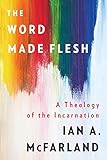The word made flesh : a theology of the incarnation / Ian A. McFarland.
Material type: TextEdition: First editionDescription: x, 249 pages ; 23 cmISBN:
TextEdition: First editionDescription: x, 249 pages ; 23 cmISBN: - 9780664262976 (pbk. : alk. paper)
- BT 220 MAC 23
- BT220 MAC .M39 2019
| Item type | Current library | Collection | Call number | Status | Notes | Date due | Barcode | Item holds | |
|---|---|---|---|---|---|---|---|---|---|
 Books
Books
|
JST Library General Stacks | BT<br>Dogma /<br>Doctrinal Theology | BT 220 MAC (Browse shelf(Opens below)) | Available | Donated by Fr. Daniel Madigan SJ, | 108674 |
Browsing JST Library shelves, Shelving location: General Stacks, Collection: BT<br>Dogma /<br>Doctrinal Theology Close shelf browser (Hides shelf browser)

|
No cover image available | No cover image available |

|

|

|

|
||
| BT 220 DUC I Am: | BT 220.DUN Christology in the making: | BT 220 LAT The incarnation: | BT 220 MAC The word made flesh : | BT 220 MIL Christ: | BT 220.MYT The Myth of God incarnate | BT 220.MYT c2 The Myth of God incarnate |
Includes bibliographical references (pages 225-232) and indexes.
Introduction: a Chalcedonianism without reserve -- The life of the creator -- The being of creatures -- 'One and the same' -- 'Perfect in divinity' -- 'And also perfect in humanity' -- Christus victor -- Jesus' presence now -- Conclusion: 'as is the word, so is God'.
"Most theologians believe in the human life of Jesus of Nazareth, we encounter God. Yet how the divine and human come together in the life of Jesus still remains a question needing exploring. The Council of Chalcedon sought to answer the question by speaking of "one and the same Son, our Lord Jesus Christ, the same perfect in divinity and also perfect in humanity, the same truly God and truly a human being." But ever since Chalcedon, the theological conversation on Christology has implicitly put Christ's divinity and humanity in competition. While ancient (and not-so-ancient) Christologies "from above" focus on Christ's divinity at the expense of his humanity, modern Christologies "from below" subsume his divinity into his humanity. What is needed, says Ian A. McFarland, is a "Chalcedonianism without reserve," which not only affirms the humanity and divinity of Christ, but treats them as equal in theological significance. To do so he draws on the ancient Christological language that points to Christ's nature on the one hand, and his hypostasis, or personhood, on the other. And with this, McFarland begins one of the most creative and groundbreaking theological explorations into the mystery of the incarnation undertaken in recent memory"--
There are no comments on this title.

